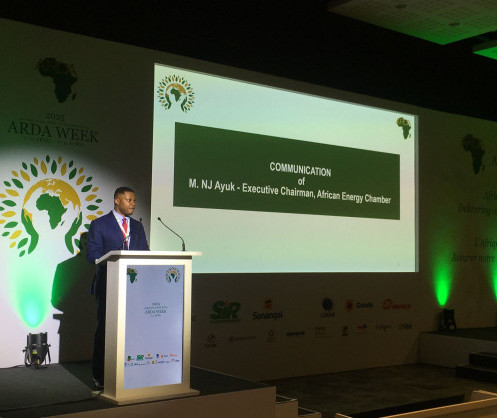Speaking at ARDA Week 2025, the African Energy Chamber underscored the need for aligned policies to advance downstream oil and gas projects in Africa
NJ Ayuk, Executive Chairman of the African Energy Chamber (AEC) (www.EnergyChamber.org), has called for greater utilization of African financial solutions to address the continent’s $15.7 billion infrastructure deficit. With these sources of capital, the continent stands to maximize the production, processing and distribution of local oil and gas resources amid efforts to make energy poverty history by 2030.
Speaking during an event organized by the African Refiners & Distributors Association (ARDA) in Cape Town this week, Ayuk proposed tapping into the $400 billion available through Africa’s pension funds to support oil and gas projects. With this capital, Africa can advance key infrastructure projects, such as pipelines, refining facilities and power generation, ensuring enhanced intra-Africa energy trade to address energy poverty. With over 600 million Africans living without access to modern energy and 900 million people living without access to clean cooking solutions, securing greater investment is key.
As such, Ayuk called for greater regulatory reform in Africa, citing the need to advance intra-African trade through the ease of movement of products and industry stakeholders, while ensuring infrastructure sharing across the continent. He pointed out that the greatest obstacle to realizing an ‘Africa-First Vision’ is not external challenges, but rather internal, owing to outdated and restrictive regulations that hinder trade and the free movement of people across borders.
Our competition should be with international markets
“How can we move commodities across the continent yet we struggle to move people?” stated Ayuk, advocating for improved visa and immigration policies to facilitate mobility for industry stakeholders and citizens.
Ayuk also called for African policymakers to address high intra-African taxes that hinder trade, while encouraging greater collaboration between African energy markets. By addressing key challenges to trade, including lack of shared infrastructure and funding, Ayuk highlighted that the continent can achieve its downstream goals. A strategy for this is collaboration. Rather than competing against one another for limited capital, Africa can pool its resources to create an integrated value chain across the continent.
“We shouldn’t compete for capital amongst ourselves,” he said. “Our competition should be with international markets.”
Besides increasing investment in downstream infrastructure and revamping policies, Ayuk highlighted that achieving the ‘Africa First Vision’ requires fully utilizing every drop of oil and gas available on the continent to power Africa’s development. He emphasized the crucial role LPG and LNG will play in advancing access to clean cooking as well as the role of natural gas in providing baseload power for the foreseeable future.
In closing, Ayuk applauded ARDA for promoting investment in African oil and gas, despite challenges posed by the energy transition. Centered around the theme Africa First: Delivering Our Energy Future, the event sought to chart a course for energy security and industrial development through increased investments across the downstream sector across the continent.



Comments are closed, but trackbacks and pingbacks are open.